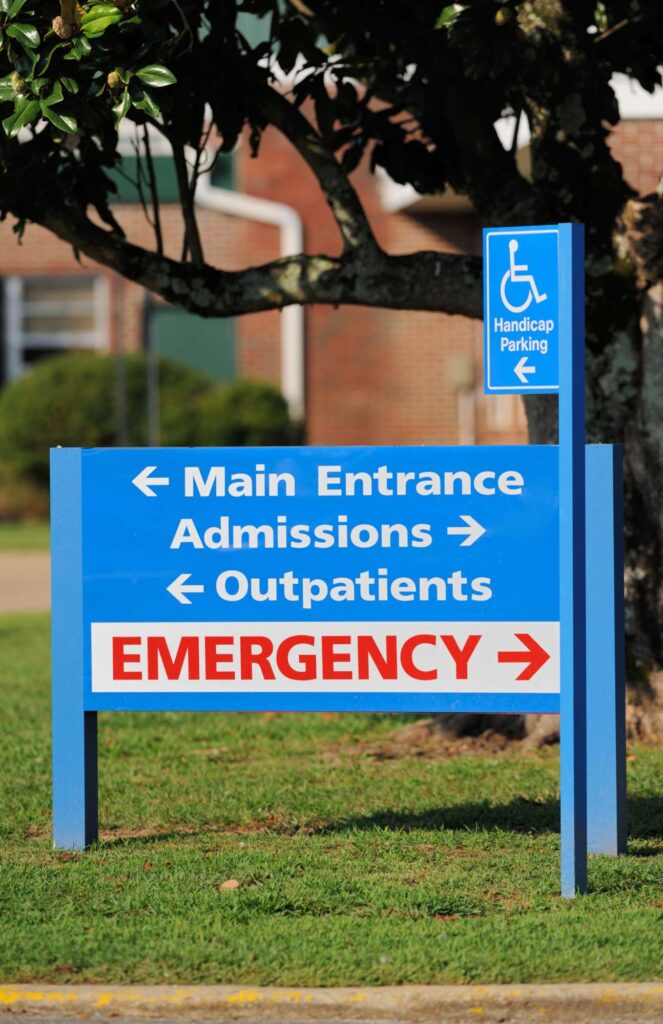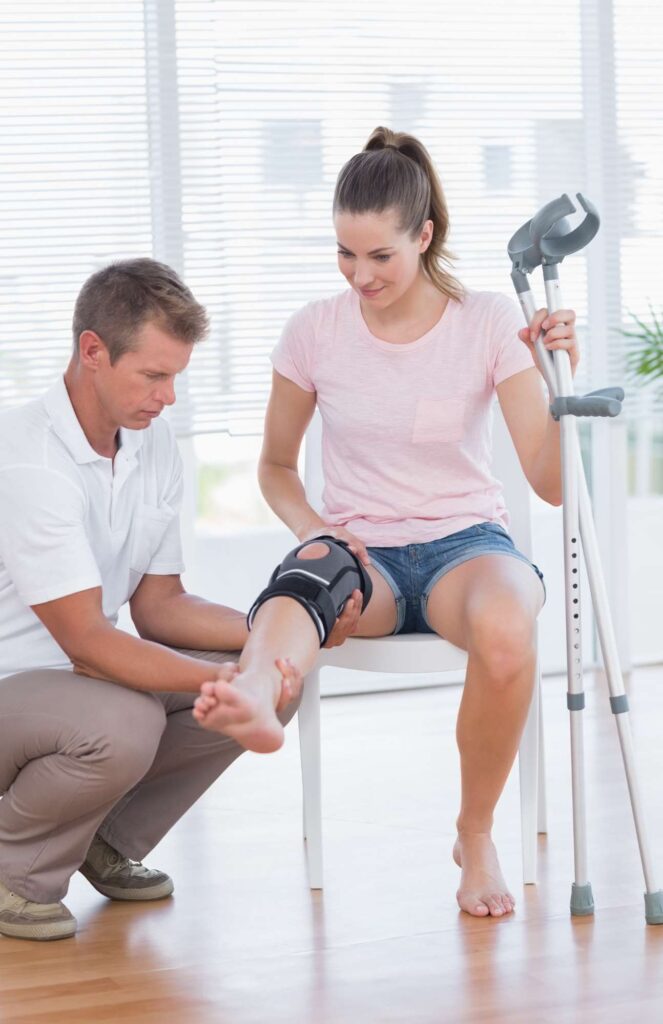Should I Go to the Emergency Room for Knee Pain? Find Out Now!
Knee pain can be a common occurrence, especially as we age or engage in physical activities. While some knee pain can be managed at home with rest and self-care, there are instances where seeking medical attention becomes crucial.
In this article, we will explore the various factors that can help answer your question of, “Should I go to the emergency room for knee pain?” and when it is appropriate to seek other forms of medical care.
Table of Contents
Understanding Knee Injuries and their Severity
To determine the answer to, “should I go to the emergency room for knee pain?”, it is important to understand the severity of the knee injury. Knee injuries can range from minor sprains and strains to more serious conditions such as torn ligaments or fractures.
If you experience severe pain, swelling, or have difficulty bearing weight on your knee, it is advisable to seek immediate medical attention. These symptoms may indicate a more serious injury that requires prompt evaluation and treatment.
Additionally, if you notice any deformity or abnormal appearance of your knee joint, it is a sign that you should go to the emergency room. Dislocated kneecaps or visibly displaced bones require immediate medical intervention to prevent further damage and alleviate pain.
Common Causes of Knee Pain
Knee pain can be caused by a variety of factors, from acute injuries to chronic conditions. Some of the most common causes of knee pain include:
- Knee Injuries: Sudden movements or trauma to the knee joint can result in sprains, strains, or even more severe injuries such as torn ligaments (such as the anterior cruciate ligament, posterior cruciate ligament or medial collateral ligament) or fractures.
- Overuse or Repetitive Strain: Engaging in activities that put excessive stress on the knee joint, such as running or jumping, can lead to overuse injuries like patellar tendinitis or bursitis. Conditions of the foot ,such as plantar fasciitis can cause knee pain as a secondary symptom.
- Arthritis: Conditions like osteoarthritis or rheumatoid arthritis can cause chronic knee pain and inflammation.
- Mechanical Issues: Problems with the alignment or structure of the knee joint, such as a misaligned kneecap or meniscus tears, can result in pain and discomfort. People of all ages can have conditions such as patellofemoral pain syndrome “runner’s knee” or patellar tendonitis “jumper’s knee.”
- Sciatica: Sciatica is a type of nerve pain that affects the sciatic nerve, which runs from the lower back down through the hips and buttocks and into each leg. Due to the involvement of the nerve, people who have sciatica can experience knee pain as well.
By identifying the underlying cause of your knee pain, you can better answer your question of, “Should I go to the emergency room for knee pain?” or if it can be managed through other means.

Immediate Medical Attention: Should I go to the emergency room for knee pain?
There are certain situations where it is necessary to go to the emergency room for knee pain. If you experience any of the following symptoms or conditions, seeking immediate medical attention is crucial:
- Severe Pain: If your knee pain is excruciating and unrelenting, it is important to seek emergency care. This level of pain may indicate a serious injury or condition that requires immediate evaluation and treatment.
- Inability to Bear Weight: If you are unable to put any weight on your affected leg or have difficulty walking due to severe pain, it is advisable to go to the emergency room. This may indicate a fracture or significant ligament tear that needs urgent attention.
- Visible Deformity or Dislocation: If your knee joint appears visibly deformed or out of place, it is essential to seek immediate medical care. This could be a sign of a dislocated kneecap or a more serious injury that requires prompt reduction and stabilization by a medical professional.
- Numbness or Tingling: If you experience numbness or tingling sensations in your leg or foot along with knee pain, it could indicate nerve involvement or compression. This requires prompt evaluation to prevent further nerve damage.
- Open Wounds or Severe Swelling: If your knee pain is accompanied by open wounds, severe swelling, or signs of infection like redness and warmth, it is important to seek emergency medical care. These symptoms may indicate an infection or significant soft tissue damage that requires immediate attention.
- Inability to Move the Knee: If you are unable to move your knee or have a limited range of motion, it may indicate a serious injury or joint instability. Seeking immediate medical attention is crucial to prevent further damage and restore function.
If you are asking, “Should I go to the emergency room for knee pain in these circumstances?” YES! It is best to err on the side of caution and go to the emergency room. Prompt evaluation and treatment can help prevent complications and ensure proper care for your knee pain.
Urgent Care Clinics for Non-Emergency Knee Pain
Not all cases of knee pain require a visit to the emergency department. Urgent care clinics can be a suitable alternative for non-emergency situations. If your knee pain is moderate and not accompanied by any of the previously mentioned severe symptoms, you can consider visiting an urgent care clinic. These clinics are equipped to handle a wide range of medical conditions, including minor injuries and musculoskeletal complaints.
At an urgent care facility, a healthcare professional can assess your knee pain, order diagnostic tests if necessary, and provide appropriate treatment or referrals. They may prescribe pain medications, recommend rest and ice, or refer you to a specialist, such as an orthopedic surgeon or physical therapist, for further evaluation and management.

The Role of Orthopedic Doctors in Knee Pain Treatment
Orthopedic doctors specialize in the diagnosis and treatment of musculoskeletal conditions, including knee pain. If your knee pain requires specialized care or if it is not improving with conservative measures, it may be necessary to consult an orthopedic doctor.
Orthopedic doctors are trained to identify the underlying cause of your knee pain through physical examination, imaging studies, and other diagnostic tests. They can provide various treatment options depending on the severity and nature of your condition. These may include physical therapy, injections, medications, or surgical interventions.
By seeking the expertise of an orthopedic doctor, you can receive comprehensive care tailored to your specific knee pain and improve your chances of a successful recovery. Know when to see an orthopedic doctor for knee pain!
The Importance of Physical Therapy in Knee Pain Management
Physical therapy plays a crucial role in the management of knee pain. Whether you have undergone surgery or are dealing with a non-surgical condition, a physical therapist can help reduce pain, improve strength and flexibility, and enhance your overall functionality.
A physical therapist will assess your knee pain and develop a personalized treatment plan to address your specific needs. This may include therapeutic exercises, manual therapy techniques, and modalities such as heat or cold therapy. They will also educate you on proper body mechanics and provide guidance on modifying daily activities to minimize stress on your knee joint.
Engaging in physical therapy can significantly improve your recovery process and prevent future knee injuries. It is important to follow your physical therapist’s recommendations and attend all scheduled sessions to maximize the benefits of this treatment approach.
When to Consult a Healthcare Provider for Knee Pain
If your knee pain is not severe enough to require emergency medical attention but persists or worsens over time, it is advisable to consult a healthcare provider.
A healthcare provider, such as your primary care physician, sports medicine doctor or an orthopedic specialist, can evaluate your knee pain, conduct a thorough examination, and recommend appropriate treatment options.
During the consultation, your healthcare provider will ask about your medical history, perform a physical examination, and may order imaging studies such as X-rays or MRI scans to further evaluate your knee joint. Based on their findings, they can provide a diagnosis and develop a treatment plan tailored to your specific needs.
Consulting a healthcare provider is especially important if your knee pain is impacting your daily activities, interfering with your quality of life, or if you have any underlying medical conditions that may complicate your recovery process. They can also advise you on,”should I go to the emergency room for knee pain?”

Knee Pain After a Car Accident: What to Do
If you experience knee pain after a car accident, you’re probably asking yourself, “Should I go to the emergency room for knee pain?” It is essential to seek medical attention promptly. Even if the pain seems mild initially, it is important to rule out any underlying injuries that may develop into more serious conditions if left untreated.
After a car accident, your knee may be subjected to sudden impact or trauma, resulting in sprains, strains, or fractures. It is crucial to have a healthcare professional evaluate your injured knee to determine the extent of the injury and provide appropriate treatment.
Depending on the severity of knee pain, your healthcare provider may order imaging tests such as X-rays or CT scans to assess for any fractures or ligament tears. They may also recommend physical therapy or other conservative treatments to manage your pain and promote healing.
Should I go to the emergency room for knee pain after a car accident?Most likely! Remember, even if your acute knee pain appears minor initially, it is always better to err on the side of caution and seek medical evaluation after a car accident.
Rheumatoid Arthritis and Severe Knee Pain: Seeking Medical Care
Rheumatoid arthritis (RA) is a chronic autoimmune condition that can cause severe knee pain and inflammation. If you have a known diagnosis of rheumatoid arthritis and experience a sudden increase in knee pain, it is essential to seek medical care.
In rheumatoid arthritis, the immune system mistakenly attacks the synovium, the lining of the joints, resulting in inflammation and pain. If left untreated, this inflammation can lead to joint damage and deformity.
Your healthcare provider, such as a rheumatologist or primary care provider, will assess your knee pain, perform a physical examination, and may order blood tests or imaging studies to evaluate the extent of joint inflammation and damage.
Treatment options for rheumatoid arthritis-related knee pain may include medications to reduce inflammation, disease-modifying antirheumatic drugs (DMARDs) to slow down joint damage, and physical therapy to improve joint function and mobility.
By seeking medical help for severe knee pain related to rheumatoid arthritis, you can better manage your symptoms, slow down disease progression, and improve your overall quality of life. They can also help you answer, “should I go to the emergency room for knee pain?”
Conclusion: Taking Care of Your Knee Health
Knee pain can significantly impact your daily activities and quality of life. Knowing the answer to, “when should I go to the emergency room for knee pain?” is crucial for proper evaluation and treatment. While the emergency room is appropriate for severe pain, deformity, or acute injuries, urgent care clinics can handle non-emergency cases.
Orthopedic doctors and physical therapists play vital roles in diagnosing and managing knee pain, ensuring a comprehensive approach to your care. Remember to consult a healthcare provider for persistent or worsening knee pain, especially if it affects your daily activities or if you have underlying medical conditions.
Lastly, if you experience knee pain after a car accident or have severe pain related to rheumatoid arthritis, seeking medical care is essential for timely intervention and appropriate treatment. By prioritizing your knee health and seeking the necessary medical care, you can alleviate pain, improve function, and enhance your overall well-being.
If you are experiencing knee pain that requires immediate medical attention, please do not hesitate to go to the emergency room. For non-emergency cases, consider visiting an urgent care clinic or consulting a healthcare provider to evaluate and manage your knee pain effectively. Remember, taking care of your knee health is essential for maintaining an active and fulfilling lifestyle.






